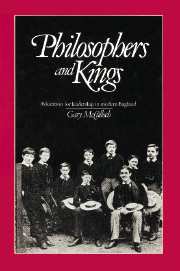4 - The ideology of Sir Cyril Norwood
Published online by Cambridge University Press: 16 November 2009
Summary
The efforts of Sir Cyril Norwood on behalf of the public schools were only one aspect of his endeavour to develop an approach to ‘education for leadership’ that might be successful in a changing society. The key problem as he saw it was to infuse the values of the public schools, which he associated with a long-established ‘English tradition’ in education, into the new state secondary schools. It was this aim that above all informed his major report to the Board of Education in 1943, on the curriculum and examinations in secondary schools.
NORWOOD AND THE ENGLISH TRADITION
Cyril Norwood, born in 1875, was educated at Merchant Taylors’ School and St John's College, Oxford. An outstanding student, he gained a first class degree in classical moderations and literae humaniores, before heading the list for entry to the civil service and being posted to the Admiralty in 1899. Within two years he resigned from this post to become sixth form classics master at Leeds Grammar School. This major shift in his prospective career was apparently made because of the scant scope for initiative that the Admiralty allowed; the new opportunities offered by the imminent introduction of state secondary education were probably another important factor in his decision. Such was his impact that in 1906 he was appointed Headmaster of Bristol Grammar School, whose academic fortunes he quickly helped to restore. In 1916 he left the state sector to become Master of Marlborough College in Wiltshire, and then in 1926 took over as Head of Harrow School.
- Type
- Chapter
- Information
- Philosophers and KingsEducation for Leadership in Modern England, pp. 41 - 65Publisher: Cambridge University PressPrint publication year: 1991



